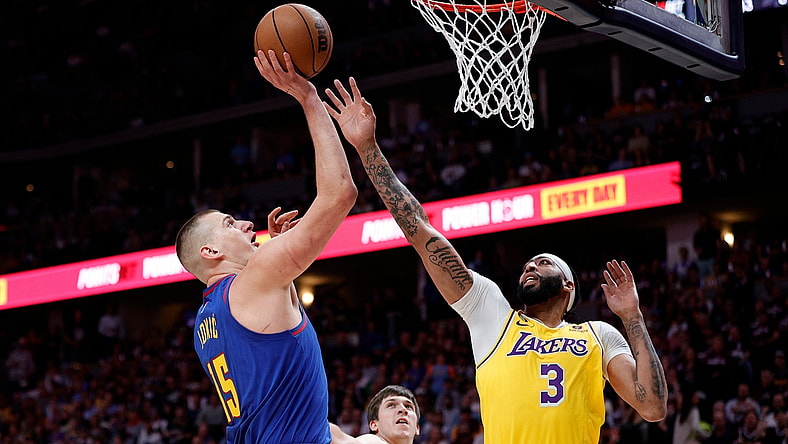
Once the ball sailed through the basket, Anthony Davis simply shook his head.
The Los Angeles Lakers’ center didn’t give Nikola Jokic any room to operate as the clock ticked close to zero. Before the Denver Nuggets’ center hoisted a 28-foot 3 before time expired, Davis contested the look. It didn’t matter. Jokic still made the shot. Davis then stared at Jokic both in awe and in disgust.
In awe because that play at the end of the third quarter captured Jokic’s dominance in the Nuggets’ 132-126 win over the Lakers in Game 1 of the Western Conference Finals on Tuesday. Jokic finished with 34 points on efficient shooting from the field (12-for-17), from deep (3-for-3) and from the free-throw line (7-for-8) along with 21 rebounds and 14 assists. In disgust because Davis and the rest of the Lakers could do very little in preventing Jokic from logging his sixth post-season triple double. Regardless of whichever approach the Lakers took with Nikola Jokic, he simply dominated the game in every way imaginable.
Davis could play aggressive one-on-one defense on Nikola Jokic. No matter. He often beat Davis, such as when he blew past him with a spin move before finishing with a dunk. The Lakers could support Davis with help defenders on Jokic in hopes to slow him down. Bad move. Jokic often found an open teammate, whether to connect to an open Kentavious Caldwell-Pope as he cut through the lane for a layup or on numerous kickouts to the perimeter that ensured strong outside shooting (15-for-32).
The Lakers featured a small starting lineup in hopes to improve the team’s spacing and pace. Bad idea. That just allowed Jokic and his teammates to dominate on the glass (47-30). The Lakers later featured Davis as a help defender, while Rui Hachimura became the primary defender on Jokic. Better idea. That became effective enough to throw Jokic off a little bit, but he had already inflicted enough damage.
Despite the Nuggets’ Game 1 win over the Lakers and Jokic’s role in it, this series appears far from over. The Lakers initially struggled with Denver’s altitude before improving their lung capacity. The Lakers also faced double-digit deficits nearly all game before reducing the Nuggets’ lead to single digits in the game’s final minutes.
Nuggets and Lakers fans can debate all they want on who will advance to the NBA Finals. This series seems so evenly matched that anything can happen. While Jokic dominated, so did Davis (40 points, 10 rebounds, three steals two blocks). While the Nuggets featured depth with Jamal Murray (31 points), Kentavious Caldwell-Pope (21), Bruce Brown (16) Michael Porter Jr. (15) and Aaron Gordon (12), so did the Lakers with LeBron James (26 points, 12 rebounds, nine assists), Austin Reaves (23 points) and Hachimura (17).
Nikola Jokic’s MVP performance in Game 1

What shouldn’t be up for debate: Nikola Jokic’s standing in the league and his value to the Nuggets. He already won two regular-season MVP awards because of the kind of performances he showed against the Lakers with versatile scoring and efficient passing. He has mitigated his defensive weaknesses. He has significantly improved his conditioning. Though Philadelphia 76ers Joel Embiid became a deserving candidate to win this season’s MVP award, that had more to do with his improved durability, developed offensive game and continued defensive consistency and nothing to do with Jokic’s apparent shortcomings.
Some sneer at Jokic’s apathy about the MVP award as if that’s a character flaw. Why shouldn’t we value players that care more about winning than individual accolades? Some point out the Nuggets’ previous playoff shortcomings as evidence Jokic doesn’t deserve his previous MVP trophies. Why should playoff performances have any bearing on a regular-season award? Some also look at the Nuggets’ recent postseason history as a valid argument that Jokic is not as dominant as he’s made out to be. Why can’t we consider the context when assessing the bottom-line results?
The Nuggets had tremendous playoff experience three years ago in the bubble when they overcame 3-1 series deficits both to the Utah Jazz and the Los Angeles Clippers. The Nuggets lost to the Lakers in the Western Conference Finals because the Lakers had a better team that had multiple players to throw at Jokic, including Davis, Dwight Howard and JaVale McGee. Nikola Jokic had his first MVP campaign the following season. But the Nuggets lost to a future NBA Finals team in the second round (Phoenix), while nursing a season-ending injury to Murray. Denver lost last season to the future NBA champions (Golden State) without Murray and Porter.
As for this season, the Nuggets are fully healthy and Jokic has become even more dominant. Denver demonstrated that identity perfectly against the Lakers in Game 1. Nikola Jokic showed aggressiveness both with scoring at the rim with dunks, layups and putbacks. Jokic demonstrated his post-up work when he backed down Davis inside on one play and sank a fallaway jumper on another. Jokic displayed his perimeter skills with accurate mid-range jumpers and 3s. Never did Jokic force those array of shots. He did so within the flow of the offense. Otherwise, Jokic set up his teammates to shine.
The Lakers found ways to keep the game close eventually. They didn’t find many ways to contain Jokic, though. Nothing captured that frustration more than when Davis shook his head repeatedly following Nikola Jokic’s deep 3 before the third quarter ended. The Lakers might continue to experience this feeling while Jokic takes his game to another level.
Mark Medina is an NBA Insider for Sportsnaut. Follow him on Twitter and on Instagram.